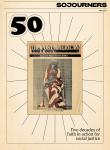TRANSGENDER PEOPLE HAVE become a flash point in America’s culture wars, particularly in communities and institutions based on religious traditions that see the gender binary—the idea that human beings are always, and only, male or female—as a fixed theological principle rather than a mutable feature of human culture. The statement that God created human beings “male and female” (Genesis 1:27) is often cited as the basis for this belief, interpreted as meaning that binary gender is a divinely determined aspect of humanity—and transgender and nonbinary people, therefore, are not.
From this perspective, the gender binary is a cornerstone of the Divine-human relationship, a way in which God’s conception of humanity is reflected in our bodies, our intimate relationships, our families, customs, rituals, and communities. Transgender and nonbinary people—people like me who do not identify as the gender associated with the sex of our bodies—must either be deluded or heretical, misunderstanding who God means us to be, or consciously rejecting the Divine-human relationship and opposing the divine order of creation.
Whatever our motivations, our claims that human beings can really “be” transgender or nonbinary, and that such identities should be acknowledged and respected, are seen as posing an existential threat to the religious traditions that safeguard the sacredness of family, community, and humanity.
I understand this perspective. I teach at Yeshiva University, an institution devoted to Orthodox Judaism, a religious tradition in which the gender binary is central to theology, ritual, and every aspect of personal and communal life. The gender binary is literally built into our houses of worship, which are designed with separate spaces for men and women, and often relegate women to a second-story gallery far from the pulpit.
I have never been Orthodox, but I have always been religious, by which I mean aware of and engaged with God’s presence. I have also always been what we now call transgender. Even though I was born, raised, and lived until my mid-40s as a male, from my earliest childhood, I felt that I was female.
Contrary to culture war assumptions, I have never felt a conflict between being religious and being transgender. Without God’s presence and help, I wouldn’t have survived a childhood spent hiding who I was from a family and world I knew would reject me. God did not reject me. God had made me; God sustained me through years of suicidal depression. No matter how others see me, God is always there.
People like me prove that identifying as transgender or nonbinary is not inherently secular or at odds with religious faith. Indeed, for me, as for many of us, the difficulty of being transgender in a binary gender world led me to cling more fiercely to God.
Who are we in relationship to God?
AS MANY COMMENTARIES note, the biblical assertion that God made human beings male and female does not mean God does not make people in other ways as well. Indeed, several early rabbis interpret Genesis 1:27 as meaning that the first human beings were androgynous, both male and female (see for example the Talmudic-era midrash Bereshit Rabbah, chapter 8), and the Talmud includes a discussion of how to adapt binary-based religious laws to accommodate people we would now call intersex, whose bodies cannot be categorized as either male or female. Here and elsewhere, rabbinic comments recognize that the divine order of creation is not threatened by ways of being human that do not fit binary gender categories, and that God’s conception of humanity is vaster and more varied than we can comprehend.
The existence of transgender and nonbinary people does not defy God’s will; instead, we manifest God’s will because, as I knew from earliest childhood, it is human culture, not God, that sorts everyone according to binary gender, and it is God, not binary gender, who determines who we are.
Because we are not mentioned in biblical texts, many who look to the Bible to understand what human beings are and should be often see transgender and nonbinary people as a threat to religious traditions and communities. Accepting that God not only makes human beings male and female but other ways as well does not require us to turn away from religious traditions and embrace secular ideas of gender. Indeed, the Bible itself prepares us to accept transgender and nonbinary people.
For example, many traditionally religious people refuse to recognize transgender and nonbinary identities because they believe that the Bible teaches that maleness and femaleness are determined by, and inseparable from, physical sex. But whenever the Bible uses male pronouns or verb forms to refer to God, it teaches us the opposite.
The Hebrew Bible does not refer to God as “he” in order for us to associate God as physically male. Indeed, the first of the Ten Commandments prohibits identifying God in terms of anything “in heaven above, or on the earth beneath” (Exodus 20:4). Instead, it is patriarchal traditions that interpret male pronouns in a way that associates God with human ideas of maleness and masculinity—that is, with maleness as gender, not physiology—and thus associate human maleness and masculinity with God. But even as these interpretations reflect and reinforce patriarchal ideas of gender (by identifying God, who has no body, as male), they also teach us to think of gender as independent of physical sex, as a way of understanding who rather than what God is. That is how transgender and nonbinary people think of gender: as a way of identifying who we are, not what kind of bodies we have.
‘Neither God nor I fit binary gender categories’
OF COURSE, MANY religious people would argue that no matter what pronouns the Bible uses, God cannot be understood in terms of human gender. I completely agree. From the time I began reading the Bible as a child, I knew that God couldn’t be what human beings mean by male or female. That gave me a sense of kinship with God: Neither of us fit binary gender categories, and both of us were invisible and incomprehensible to those we loved.
From the beginning of Genesis, when God creates the physical universe, the Bible makes it clear that God can’t be understood and shouldn’t be conceived of in terms of human categories such as gender.
Moses hears God speaking through the bush that burns and is not consumed; the Israelites experience God’s presence in thunder and lightning at Mount Sinai; Elijah identifies God in the “still, small voice” outside his cave; God works miracles such as the plagues of Egypt and manna in the wilderness; Psalm 147 reminds us of God in mundane wonders such as rain and grass and snow. Over and over, the Bible teaches us that we don’t need God to fit binary gender categories to recognize God’s presence, to feel God’s love, or to put God at the center of our communities and our lives.
Human beings are made in the image of this category-defying God.
The Bible tells us three times that we are made in the category-defying image (once in Genesis 1:26 and twice in 1:27) before it mentions sexual dimorphism, physical maleness and femaleness (which, as the story of Noah’s ark reminds us, is common among humans and animals alike). To God, what makes us human is not that we are made male and female: It is that we are made in the image of our Creator who, unlike the deities featured in Iron Age creation myths, has neither body nor sex nor gender.
Did Abram and Sarai shed their assigned gender roles?
THE EXISTENCE OF transgender and nonbinary people does not contradict what the Bible teaches us about God’s conception of humanity. Our existence reinforces that teaching by demonstrating the difference between the gender categories human beings rely on to identify one another and the image of God by which God identifies us.
It can be hard to make that distinction because, in both secular and religious communities, so many roles, relationships, rituals, customs, and institutions require us to identify and be identified in terms of binary gender that it is easy to think of maleness and femaleness not as categories we are assigned at birth but as unchangeable essences that define who and what we are—or, many religious people say, who and what God created us to be.
But one of the Bible’s most famous stories makes it clear that God means us to be more than the gender roles we are born into, and that sometimes God calls us to leave those roles behind and live lives our families and communities do not understand.
According to the Bible, the starting point for what would become Judaism is the moment when Abram—who, as Terah’s first-born son, is expected to care for his father all his life and assume his father’s position after his death—hears God say, “Go from your country, your people, and your father’s household to the land I will show you” (Genesis 12:1). If God had created human beings to be always and only the men or women we are born, raised, and expected to be, then Abram would have said no. And if Abram had believed that he was and could only be what his culture said a first-born male should be (with all the rights and responsibilities of inheritance in a primogeniture system), then the Bible as we know it would never have been written.
“Real men don’t abandon their fathers,” Abram might have said to himself, “and real gods don’t tell people to violate ancient traditions and sacred family duties.” Or maybe Abram would have believed, as trans and nonbinary people are often told to believe, that the voice summoning him to live the life God created him to live was not the voice of truth but the voice of temptation, irresponsibility, selfishness, deviance, delusion, and sin.
Abram didn’t let being a first-born son stop him from recognizing and answering God’s call. He left behind the gender role he was born into and the identity and responsibilities that went along with it and accepted a new identity, one defined not by his relationship to his family or his people but by his relationship with God.
God also called Sarai, Abram’s wife, beyond assigned gender roles when God tells her she will bear a child in extreme old age. Sarai’s miraculous conception confounds traditional binary gender roles—without divine intervention, being both a new mother and an elderly woman is impossible—as well as the gender binary assumption that biology (in this case, Sarai’s age) determines who we are.
Again and again, the Bible highlights people—Abram, Sarai, Moses, Deborah and other Hebrew prophets, and Jesus and the apostles—who answer God’s call to stop being the men and women their families and cultures expect them to be and let God, not gender, define them.
That’s what I did when, after decades of pretending to be a man I knew I wasn’t, I realized that—even though it would cost me my family, friends, and job—I had to live as the person God created me to be.
My life as an openly transgender person is not a rejection of God or the Bible: It is an expression of the truth God planted within me, my way of bearing witness to the incomprehensible image of God in which, the Bible teaches, each of us, trans or not, is made.

Got something to say about what you're reading? We value your feedback!






